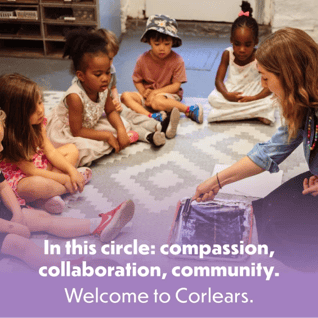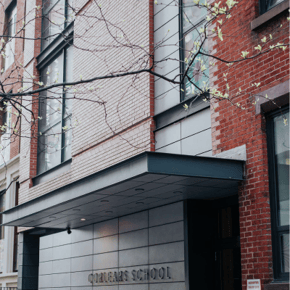In Corlears’ nursery and preschool classrooms, the toddlers are planting seeds, continuing to care for them, and watching as they evolve into full-grown beans and herbs.
“I think it’s going to grow later. Not today. A different day. Today it started to grow. It’s so exciting!”
“I can’t wait for it to grow more. It will grow upper and upper and then the soil will reach the sky!””
By gardening in the classroom, children learn about more than just how plants grow. They’re also having conversations about caring for our Earth and living things, working through emotions associated with change – and learning patience, too.
To begin the unit for the 2s class, students had a chance to paint their own pots. Next, they added soil and used their sense of touch and sense of sight to explore it. “A lot of questions came up that were things we were hoping to illicit. ‘What can it be used for?’ ‘What will happen next?,’” explains Brian, a 2s Head Teacher. Students even noticed that the soil changed when they added water.
Some seeds were then planted in the pots, which allows toddlers to practice patience as their seeds grow. Others were planted in plastic bags so students could see the seedlings’ evolution.
As time goes on, the class will continue to observe their seedlings changing – another important lesson, explains Brian. “The seed is never quite the same. We ask questions and say little things while they’re looking at something growing and support them in realizing, ‘it’s changing and that’s OK. It’s not the same, and it’s OK.’”
In the end, the class will have a chance to try some of the produce they’ve grown. “It’s important to follow it through the entire process – to see the product of your care and time,” Brian explains.
The entire project not only promotes inquiry-based learning, a critical piece of the Corlears curriculum, but it also sets the stage for discussing larger concepts in the future.
“The goals include learning to appreciate and engage with nature,” 2s Head Teacher Michelle says. “Before we can introduce a big concept like pollution, they are able to develop the appreciation of the natural world. This is motivating before big concepts” – and lays the groundwork for a deeper sense of advocacy later in life in terms of protecting and caring for nature.



